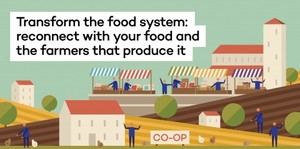The globalisation of food production has led to an industrial monopoly within the agricultural sector. A small number of companies now dominate the supply of seeds, agri-chemicals, processing, logistics and even food production. However, communities across Europe are showing that there is another option, and taking back ownership of food production – as our new report shows.
From farmers' markets in Prague to community-supported agriculture systems – where communities come together to collectively buy from and support local farms – in France and Italy, citizens are taking back control of the food system.

In practice, this means going beyond buying 'local' food from big chains which otherwise reinforce our broken, industrialised agricultural system. It means making entire food systems local: working with other citizens and farmers to shorten supply chains for the benefit of local communities and economies.
In Italy, for example, the Gruppi di Acquisito Solidale movement allows communities across the country to group together to buy directly from sustainable local producers, with whom they are in direct contact. There are now 2,000 Gruppi di Acquisito Solidale groups across the country, with an average annual turnover of €90 million.
Adanella Rossi, a member of the Pisa Gruppi di Acquisito Solidale and a researcher at the University of Pisa, explains: "Our movement represents an alternative to a system that we do not agree with. It allows us to translate our beliefs into everyday life; it helps us live our values. Neither the consumers nor the producers are on their own, and there is no self-interest. Our consumption is not based on exploitation, of the land, of man or of animals. There is no surplus or waste. All the food has a purpose, and there are far fewer risks to health."
Re-localising the way we produce, process, and distribute food can help shift our economy so that it addresses the problems of climate change and biodiversity collapse, as well as the rising levels of social and economic inequality.
Policymakers now need to recognise the value of agroecological approaches to the food system and support them in multiple policy areas – including health, environment, rural development, trade and agriculture – noting that they can deliver solutions to many cross-departmental policy challenges, especially at local and regional levels.